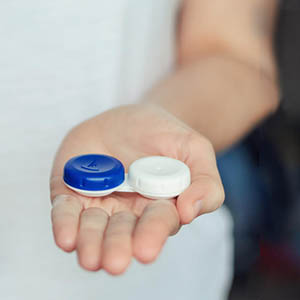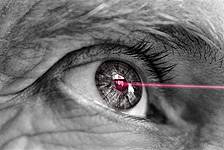Up to five percent of contact lens wearers will develop GPC in their lifetime.
Giant papillary conjunctivitis (GPC) is an allergic reaction that causes small round bumps called papillae, to develop on the inner lining of the upper eyelid.
In many cases, GPC is caused by seasonal allergies or eczema, though it can also occur when your eyelids become irritated from constantly rubbing over a foreign object in your eye, such a contact lens or sutures.
If you wear soft contact lenses, you are 10 times more likely to develop GPC because allergens are more likely to accumulate on the surface of your lenses.
Symptoms of GCP
- Red eyes
- Itchy eyes
- Watery eyes
- Swollen eyelids
- Mucous discharge
- Blurred vision
- Discomfort from contact lenses
- Foreign body sensation in your eye
When the condition first appears, the inside of your eyelid may appear red and swollen, or feel itchy and sore. As the condition worsens, papillae begin to develop and continue to grow in size until the condition is treated.
These symptoms can make contact lens wear uncomfortable or even impossible.
What causes GPC?
Giant papillary conjunctivitis can develop from a number of different causes:
- Wearing soft contact lenses
- Protein deposits on your contact lenses
- A foreign body that rubs against the upper eyelid, such as a contact lens, artificial eye, or stitches
- An allergic reaction to your contact lenses or lens products
- Wearing contact lenses during seasonal allergy flare ups
If you suspect you have an eye condition, contact an eye doctor near you, who can diagnose and treat the condition.
SEE RELATED: Who Can Benefit from Scleral Lenses?
How is GPC treated?
If you are experiencing symptoms of GPC, or any type of discomfort while wearing your contact lenses, remove your contact lenses and schedule an eye exam as soon as possible.
Treating GPC typically involves making some necessary changes to your contact lens routine:
Cleaning and disinfecting
- Clean your lenses thoroughly after each use with a preservative-free cleaning solution.
- Refill your contact lens storage case with fresh disinfecting solution every night.
- Sterilize your contact lenses with a hydrogen peroxide solution.
- Clean your contact lenses with a proteolytic enzyme, as recommended by your eye doctor.
- Replace your contact lenses regularly, as recommended by your eye doctor.
Your eye doctor may also recommend avoiding contact lens wear until your GPC symptoms disappear and your eyes heal completely.
If your symptoms are severe, your eye doctor may prescribe eye drops that contain an antihistamine or steroid to reduce swelling, promote healing and provide further relief.
Which contact lenses are safe to wear with GPC?
Soft contact lenses that are worn for an extended period of time, such as bimonthly and monthly lenses, are more likely to accumulate protein deposits and allergen particles overtime, which can lead to GPC.
If a diagnosis of GPC is given, your eye doctor may recommend switching to rigid gas permeable (RGP) lenses or scleral lenses.
Rigid gas permeable lenses do not accumulate protein deposits and debris the way soft lenses contact lenses do. Therefore, RGP lenses are less likely to cause an inflammatory reaction.
Scleral lenses for GPC
Scleral lenses are the preferred choice of contact lenses for most patients with GPC.
Scleral lenses are larger than both soft lenses and RGP lenses, and are known to be more stable on the eye and less likely to cause eyelid irritation upon blinking.
Scleral lenses are also made with gas permeable material so that a sufficient amount of oxygen can reach the surface of the eye.
Moreover, the reservoir of saline solution that remains in the space between the scleral lens and the cornea ensures a moist environment for the eye, and provides constant soothing relief for irritated allergic eyes.
Note: Even scleral lenses can cause GPC if they are not cleaned properly on a daily basis. Always follow your eye doctor’s instructions on how to properly clean and disinfect your scleral lenses.
Many doctors recommend using a peroxide cleaning solution to ensure that your lenses remain clean and clear of any debris buildup that can lead to GPC or any other eye condition.
Daily disposable contact lenses are another option for patients with GPC, as these lenses are discarded after each use and therefore eliminate the risk of developing this condition.
LEARN MORE: Optical and Contact Lenses
If you are experiencing symptoms of GPC, schedule an eye exam as soon as possible.
The sooner GPC is diagnosed, the sooner you will be able to make the appropriate changes to your contact lens wear and begin to feel better.









